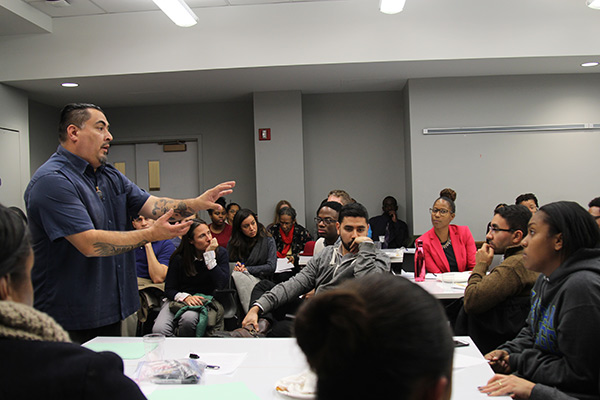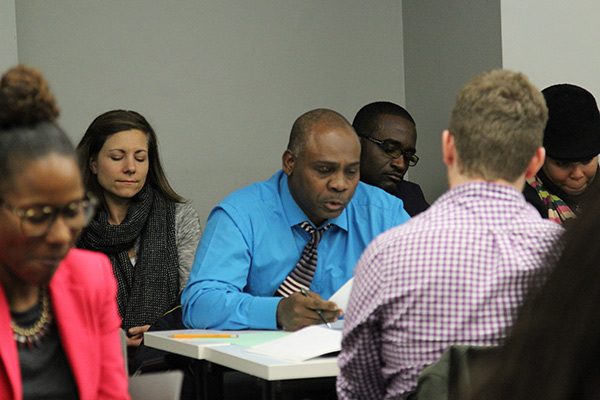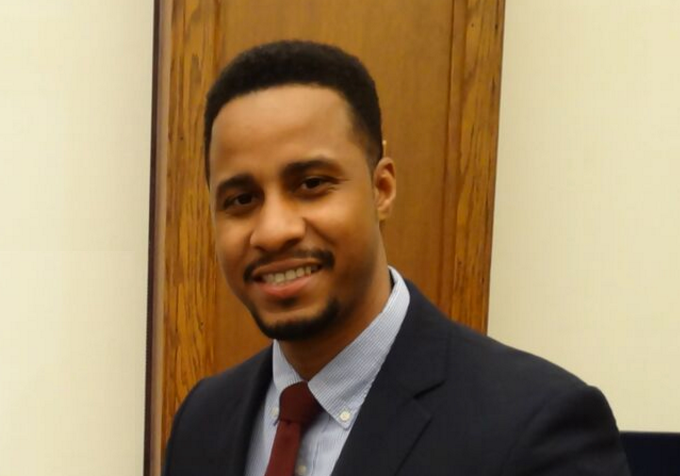Trumping Hate through Indigenous Ways of Knowing: A firsthand report of catharsis at a TC Racial Literacy Roundtable
By Angel Acosta

When I walked into the latest gathering of TC’s Racial Literacy Roundtable series in early December, the energy in the room was both electrifying and soulful.
Electrifying, because of the capacity crowd, drawn from inside and outside the university by the urgency of the discussion topic: “Trumping Hate: Savior's Complex, Cultural Humility and Today’s Educator.”
Soulful, because the room was suffused with a powerful but soothing scent. The evening’s keynote speaker and workshop facilitator, Cesar Cruz – a culturally responsive educator and human rights activist – was burning sage and sweet grass, walking to each corner as if to bless the space and prepare it for what would be one of the most transformative events of the fall semester.
That ceremonial offering, together with Cesar’s authenticity, lightened the mood. We were still in the immediate aftermath of the presidential election, the divisive rhetoric of the Trump campaign, and the resulting spike in hate crimes against people of color. The violation of indigenous sovereignty in Standing Rock was still fresh, while the deaths of black people at the hands of police remained a constant backdrop. An elected official from West Virginia had recently called the First Lady an “ape in heels” and a video of middle school children yelling “Build a wall!” during lunch had gone viral.
“The resistance at Standing Rock and the momentum from other mass movements suggest an elevation of consciousness and confirm that 'We are exactly where we are supposed to be' – an allusion to the Native American prophecy of the Seventh Generation, which will rise to restore equilibrium to the planet.”
After an introduction by TC Professor Yolanda Sealey-Ruiz, Cesar, as he prefers to be called, told us that he wasn’t there to “save” anyone, but rather to facilitate a process that would bring us closer to our inner sources of inspiration.
For Cesar, one such inspiration is his ancestral lineage, which he traces to the Huichol people in Mexico. He burns sage and sweet grass to show appreciation for these ancestors and express a sense of gratitude for being alive.
Cesar believes that protecting such indigenous ways of knowing is a critical part of the perennial fight for freedom. He reminded us that just a few days prior, more than 2,000 military veterans had arrived at the Oceti Sakowin camp, where Water Protectors were resisting the construction of the Dakota Access Pipeline. In a gesture that has never been extended by the U.S. government, some of these veterans apologized to tribal elders for the history of colonialism and intergenerational violence against indigenous communities.
For Cesar, the resistance at Standing Rock and the momentum from other mass movements suggest an elevation of consciousness and confirm that “We are exactly where we are supposed to be” – an allusion to the Native American prophecy of the Seventh Generation, which will rise to restore equilibrium to the planet.

Cesar’s framing of this historical moment in the larger context of indigenous epistemology felt like a call to action. I have long believed that our culture of hyper-consumption, propelled by neoliberal economic policies, is contributing to the deterioration of our planet’s health and our collective sanity. I felt revitalized by this clarion call to join in efforts to bring back some kind of balance.
Cesar urged us to intentionally draw energy from our ancestors, meaning anyone who has passed or who has had a major impact in our thinking. He asked audience members to read powerful quotes from Nelson Mandela (during his incarceration); from Lolita Lebrón, a Puerto Rican nationalist and opponent of U.S. colonialism; and Yuri Kochiyama, the American political activist who held Malcolm X’s head after he was shot in the Audubon Ballroom. Mandela’s words, read by a first-year doctoral student, felt especially resonant:
“Listening to these heartfelt and intensely personal letters, we felt a profound closeness with one another. The silences between readings were equally powerful. TC’s academic space had been transformed to make room for different ways of knowing and processing the heaviness that so many of us were feeling.”
No one is born hating another person because of the color of his skin, his background, or his religion. People must learn to hate, and if they can learn to hate, they can be taught to love, for love comes more naturally to the human heart than its opposite.
Then Cesar asked each of us to write a letter to ourselves from the perspective of one of our own beloved ancestors. We also had the option of addressing a letter to an ancestor. I struggled to pick someone. Should I write in the voice of Frederick Douglass? To the jovial salsa queen, Celia Cruz? I ended up writing a letter to myself from my grandfather, a tobacco farmer in the Dominican Republic. I remember listening to him share stoic insights about the centrality of storytelling, community engagement and the long road to progress. The exercise was challenging but awakened dormant thoughts inside me.
We shared our letters with partners, and then, at Cesar’s request, some people valiantly read to the group. One woman read:
Dear Maria (pseudonym),
You anger is a representation of love. It is a love for people. It is a deep fervent representation of your desire to bring back an equilibrium to humanity. Your pain is valid and warranted. Given how stripped we’ve been of our existence, robbed of our very essence, it is time to fuel love and activate love. For restorative justice requires transformational love. Love will emancipate us. You. Me. We. Hatred will keep you in prison. Love will fulfill the purpose of our people.

A TC faculty member read her letter to James Baldwin and Malcolm X:
Dear Malcolm and James,
I love you. Your spirits haunt me. You both push me to be what I knew I was born to be. You provide an example of fearlessness for me. You push me to speak up against injustice, White supremacy, hatred and inequity. And you show me that there is anger…then love…then action. James, through your letters and books I constantly seek courage and a way of being in this world that is both wicked and full of hope. Malcolm, you teach me that a righteous anger and an intense love of my people, and those who love my people, guide me and will make my path straight. A path that leads to justice and love…love…I love you…James…Jimmie…Malcolm….X!
This exercise tapped into something deep within everyone in the room. Listening to these heartfelt and intensely personal letters, we felt a profound closeness with one another. The silences between readings were equally powerful. TC’s academic space had been transformed to make room for different ways of knowing and processing the heaviness that so many of us were feeling. The experience was cathartic; the wisdom pouring out of each letter exactly what we needed to hear.
“I have felt recharged, my anger and despair reframed by a new sense of clarity. My work moving forward will be unapologetic, critical of asymmetrical power relations and focused on advancing radical healing through education.”
With just a little time left, Cesar spoke to us about the importance of unlearning the savior’s mentality that so often limits the range and impact of educators’ work. Building on that idea, an audience member shared the question that the scholar Bettina Love poses to teachers: Do you truly love the kids? Or do you like the way they make you feel about the work you do?
“We must be critical lifelong learners who are constantly self-reflecting,” declared Cesar. He referred us to an array of scholarship on culturally responsive teaching and critical pedagogy, including:
- The Mis-Education of the Negro, by Carter G. Woodson
- Subtractive Schooling, by Angela Valenzuela
- Hope and Healing in Urban Education, by Shawn Ginwright
- The Art of Critical Pedagogy, by Ernest Morrell (TC’s Macy Professor of Education) and Jeff Duncan-Andrade
- Critical Race Counter Stories, by Tara J. Yosso
- Growing Critically Conscious Teachers, edited by Angela Valenzuela
Since this remarkable event, I have felt recharged, my anger and despair reframed by a new sense of clarity. My work moving forward will be unapologetic, critical of asymmetrical power relations and focused on advancing radical healing through education.
I have continued to reflect, especially on Martin Luther King Jr.’s assertion that “the arc of the moral universe is long, but it bends towards justice.” What if King was wrong? What if Ta-Nehisi Coates’ claim that this arc actually bends towards chaos is more in line with the truth? For me, the answer, ultimately, is unimportant. What is crucial is that we stand together in solidarity, with a deep commitment to speaking truth to power. Only then can our collective agency bend the arc of the moral universe toward equity and justice for all.
Angel Acosta, a doctoral student in Teachers College’s Department of Curriculum & Teaching, is TC’s inaugural Anne R. Gayles-Felton Endowed Scholar. Click here to read a story about him.
Published Friday, Jan 13, 2017